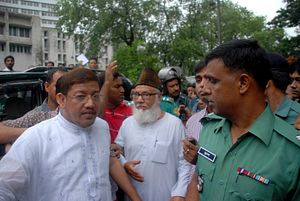An alleged perpetrator of history’s forgotten genocide in Bangladesh is finally about to face justice for his part in the slaughter of some 3 million civilians.
Motiur Rahman Nizami was in his late 20s in 1971 when his home country fought for its independence from Pakistan’s oppressive rule.
But Nizami was no patriot; instead, he collaborated with the Pakistani army as it attempted to crush the Bangladeshi uprising with terror and murder.
More than four decades later, Nizami now faces 16 charges before the International Crimes Tribunal (ICT) in Dhaka, Bangladesh’s capital. Established in 2009, the ICT is finally prosecuting the war criminals of 1971. The charges include crimes against humanity, genocide, murder, torture, rape and property destruction – most of which are based on eyewitness accounts.
Nizami is accused of personally carrying out and ordering the deaths of nearly 600 Bangladeshis as well as the rape and the torture of many others. He led the fearsome Al Badr terror group, which was modeled on Hitler’s SS. When its terror tactics failed to subdue brave Bangladeshis, it turned to torture and murder.
The ICT has spent the past year hearing evidence against Nizami. A verdict is expected soon. The verdict, whichever way it goes, will hopefully bring some sense of justice to the families of those harassed, beaten, tortured and slaughtered during the genocide. The ICT has so far found eight people guilty of war crimes and another eight major cases are pending.
The atrocities committed by Hitler, Stalin and Mao have been extensively documented. The crimes of Cambodia’s Pol Pot were chronicled in the film, The Killing Fields. But memory has not been as kind to the birth of Bangladesh, which was particularly bloody even by the modern standards of political revolution.
Some 200 million Bengali people of East Pakistan sought self-determination in 1971, but the Pakistani army was not about to let that happen easily. The Indian armed forces intervened and turned the tide that led to the new state of Bangladesh, but not before Pakistan – collaborating with Nizami and others – tried to cripple the fledgling democracy in its infancy by destroying its intellectual leadership. They devised a horrific plan to kidnap, torture and execute the best minds of Bangladesh – professors, engineers, artists and scientists.
One ICT witness, a former Bangladeshi freedom fighter who recounted that he had been beaten and pistol-whipped by Nizami, visited one of his torture sites after the war ended. There, he found human skulls and severed limbs lying around like rubbish. Nizami’s trial was filled with gruesome memories like this.
Nevertheless, some seek to delegitimize the ICT. Why? As a result of Bangladesh’s young, chaotic history and its strong sectarian camps, Nizami not only escaped justice for four decades, he rose to a leadership position in a political organization, a group known for its terror tactics called Jamaat-e-Islami.
Jamaat was a key collaborator with the Pakistani military during the 1971 war against Bangladesh. Nizami formed Al Badr out of Jamaat in 1971.
Since then, Jamaat has worked to destroy the country’s pluralistic constitutional democracy. It should not be a surprise that the Nizami-led Jamaat is responsible for a spree of murder and violence across Bangladesh over the past year, coinciding with the ICT’s deliberations and resulting in some 500 deaths.
If Nizami is found guilty, Jamaat sadly might unleash another wave of violence on the innocent citizens of Bangladesh. Jamaat will claim that its leader was tried for his political affiliation and his opposition to the current government. Some in the media will repeat this, ignoring Nizami’s horrific crimes.
That would be a desecration of the memories of those butchered during the genocide, especially those alleged to have been killed by or on the order of Nizami. Jamaat and its apologists want to change the argument, but they cannot. The crimes occurred: those innocent Bangladeshis were beaten, raped, tortured and murdered. The deeds cannot be erased. Now it’s time for justice to be done.
Mohammad A. Arafat is Executive Director of the Shuchinta Foundation and a lecturer at Bangladesh’s Independent University.
































